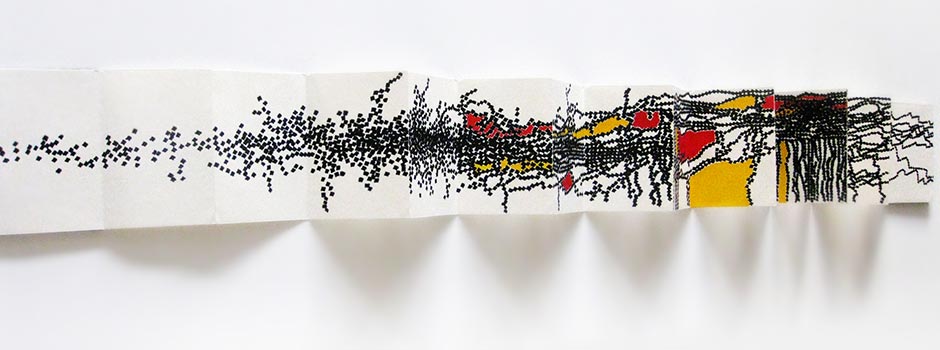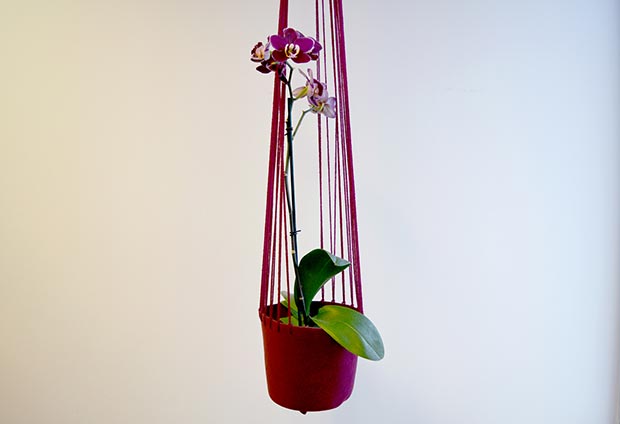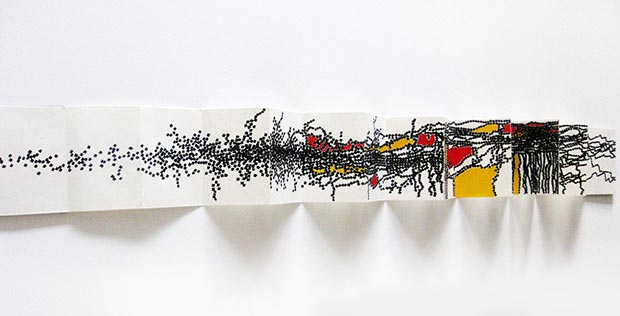
ART EVENT The Third Line at Art Dubai
Mar 30, 2015 Art Event

Returning to Art Dubai, The Third Line participated with more than ninety leading regional and international galleries. The presentation showed synergies of movement, socio-political thought and interpersonal reflection.
-Islamic-Arts-Magazine_The_Third_Line_01.jpg) The Third Line's Booth at the Art Dubai 2015 / Photo © Islamic Arts Magazine
The Third Line's Booth at the Art Dubai 2015 / Photo © Islamic Arts Magazine
-Islamic-Arts-Magazine_The_Third_Line_02.jpg) The Third Line's Booth at the Art Dubai 2015 / Photo © Islamic Arts Magazine
The Third Line's Booth at the Art Dubai 2015 / Photo © Islamic Arts Magazine
New drawings by Abbas Akhavan use stone paper with water based inks to create drips and wells, utilising the natural pull of the earth. New works by Arwa Abouon, from her Dear Men series, uses Fez Hats as flowerpots in a symbolic representation of the young boys in her life blossoming into men.
-Islamic-Arts-Magazine_The_Third_Line_04.jpg) Abbas Akhavan, Arwa Abouon and Huda Lufti / The Third Line at the Art Dubai 2015 / Photo © Islamic Arts Magazine
Abbas Akhavan, Arwa Abouon and Huda Lufti / The Third Line at the Art Dubai 2015 / Photo © Islamic Arts Magazine
_2014_R_Sara_Naim_Metamorphic_Masafi_1_2015.jpg) Left: Abbas Akhavan, Untitled (2), 2014, Ink on stone paper, 64x44 cm / Right: Sara Naim, Metamorphic Masafi 1, 2015, C-type digital print, 7.85x17.7cm / Both photos courtesy of The Third Line and the Artist
Left: Abbas Akhavan, Untitled (2), 2014, Ink on stone paper, 64x44 cm / Right: Sara Naim, Metamorphic Masafi 1, 2015, C-type digital print, 7.85x17.7cm / Both photos courtesy of The Third Line and the Artist
 Arwa Abouon, Flower Man,2014, Fez Hats, wool thread, orchid, 129.5x17.8cm / Courtesy of The Third Line and the Artist
Arwa Abouon, Flower Man,2014, Fez Hats, wool thread, orchid, 129.5x17.8cm / Courtesy of The Third Line and the Artist
Golnaz Fathi presents works from her diary series that log her calligraphic scribbles and drawings during her travels and personal time. The found assemblage work by Huda Lutfi is from her last major body of work, ‘Cut and Paste’, which looks at a personalised historical narrative of a still unclear documentation of Egypt’s recent past.
-Islamic-Arts-Magazine_The_Third_Line_03.jpg) Golnaz Fathi in the foreground / The Third Line at the Art Dubai 2015 / Photo © Islamic Arts Magazine
Golnaz Fathi in the foreground / The Third Line at the Art Dubai 2015 / Photo © Islamic Arts Magazine
 Golnaz Fathi, Dots, 2013, marker and ink on chinese paper, 21 pages, 17x21cm / Courtesy of The Third Line and the Artist
Golnaz Fathi, Dots, 2013, marker and ink on chinese paper, 21 pages, 17x21cm / Courtesy of The Third Line and the Artist
Pouran Jinchi’s work is an investigation into deconstructing calligraphy and explores the physical form and its signified insinuations through the lens of the dark narratives of The Blind Owl, a major literary work by Iranian author Sadegh Hedayat. Metamorphic Masafi, one of Sara Naim’s most recent bodies of work, are photographs of landscapes occupying the historic region within the Emirates; specifically looking at Metamorphic mountains which are constantly and patiently evolving through the rock’s heat and pressure.
_2013_Ink-and-Copper-on-paper.jpg) Pouran Jinchi, Dots (The Blind Owl Series), 2013, Ink and Copper on paper, 95pcs, 56.5x38cm (detail) / Courtesy of The Third Line and the Artist
Pouran Jinchi, Dots (The Blind Owl Series), 2013, Ink and Copper on paper, 95pcs, 56.5x38cm (detail) / Courtesy of The Third Line and the Artist
Slavs and Tatars provide a preview into their new body of work 'Mirror for Princes', with an installation of hats. A form of political writing often called advice literature, shared by Christian and Muslim lands, in particular during the Middle Ages but also with notable examples in the 16-19th centuries, 'Mirrors for Princes' attempted to elevate statecraft to the same level as faith/religion.
-Islamic-Arts-Magazine_The-Third-Line_03.jpg) Slavs and Tatars, The Square and Circurls of Justice, 2014, Steel textile cotton turbans polyester hats / The Third Line at the Art Dubai 2015 / Photo © Islamic Arts Magazine
Slavs and Tatars, The Square and Circurls of Justice, 2014, Steel textile cotton turbans polyester hats / The Third Line at the Art Dubai 2015 / Photo © Islamic Arts Magazine
Comments
Add a comment